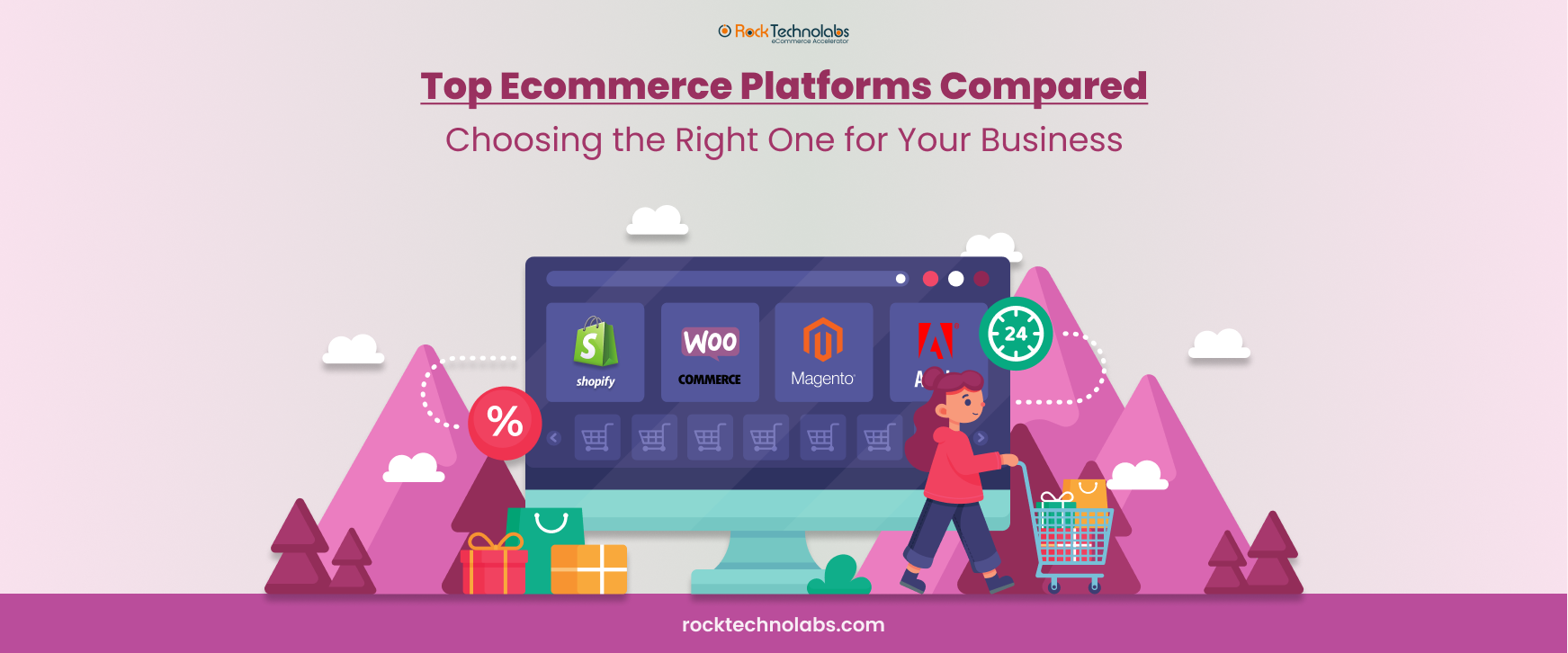Top Ecommerce Platforms Compared: Choosing the Right One for Your Business
As a business owner, whether you are ready or not, the ecommerce industry is another giant elephant that has covered many corners of the world with its size and demand. Nowadays, internet user are wandering over various platforms to browse, compare and purchase numerous items of their choice.
Even one of the most prevailing trends in the world of e-commerce is the unimaginable usage of mobile devices. As per Statista, in 2023, smartphones accounted for over 70% of all retail website visits worldwide, resulting in the majority of online orders compared to desktops and tablets.
Moreover, Online retail continues to grow because of the escalating usage of smartphones and tablets globally, and mobile commerce is estimated to be responsible for https://www.shopify.com/enterprise/global-ecommerce-statistics. Being a merchant and online retail, you may be aware of this data and stuck at a single point even after deciding to opt for an online store.
A store that fulfils the demands of your buyers and offers an exceptional experience, which results in higher conversion and, thus, higher revenue.
So there are multiple options available in the market that you can choose from according to your requirements or not; however, to make your task double-free, we have written this detailed guide that compares different platforms based on other criteria that should be considered when thinking about settling on a particular one.
4 Best Ecommerce Stores For Exponential Growth Of Your Business
Shopify/Shopify Plus
Shopify is a very user-friendly ecommerce platform that works by centralizing all your customer data, product data, and operational tasks in one system that integrates all your sales channels in one place. They offer over 100 free and paid themes to ease website creation tasks and provide a best-in-class suite of business tools to form an all-in-one business command center.
Plus, irrespective of your business size, Shopify can handle all your products as it has unlimited bandwidth for storage. In addition, if you want to go for reasonable shipping rates, Shopify has enough shipping options like USPS, UPS, DHL Express, and other shipping carriers.
Features
- Shopify fulfilment network for order management
- Shopify theme store for free and professionally designed industry-based templates
- Customization option for personalized storefront
- Shopify POS, an iPad app to track all client’s orders at one place
- Metafields for customizing information that isn’t usually captured in the Shopify admin.
- Shopify App Store, Certified app technologies for Shopify Plus, Shop cash offers, and many more such unique features
Pros
- Have support for major payment gateways like PayPal, Stripe, and Apple Pay.
- Shopify themes guarantee exceptional mobile-friendly websites
- Tons of apps and plugins for enhancing store operations
- It is the perfect choice for dropshipping businesses due to the seamless integration of numerous apps.
- Shopify has a 24×7 customer team that can assist you anytime.
- A self-sufficient platform that doesn’t depend on any host.
Cons
- Hosting prices could cost you more than you thought. However, it comes with 3 options to choose from.
- Customization limitations in terms of checkout and thank you page.
- Shopify has no email hosting.
- Difficulty to exist the platform.
Magento
Magento is a robust open source ecommerce platform with mainly two editions, Magento Open Source and Adobe Commerce (also called Magento 2), which is the latest one and comes with a paid version with many features and functionality. It has an exemplary user interface for non-technical people and supports many programming languages like PHP, CSS3, HTML5, and MySQL.
Magento’s most expensive plan is the Magento 2 commerce cloud, an ideal option for ecommerce store businesses dealing with a large amount of data and traffic. However, this platform mainly demands good coding skills and technical know-how to manage the entire website infrastructure; if you choose such a platform, the best decision is to hire a team of Magento 2 developers.
Features
- Bundles of diverse marketing and conversion tools (some of them are Display stock availability, track coupons, support for MAP, free shipping options, and many more).
- Complete catalogue management features
- Enhanced order management features such as multiple invoices, split fulfilment, shipping labels, email notifications, and RSS feeds for order status.
- Comprehensive customer account dashboard.
- Support for multiple currencies, languages, local taxes, localization, and accented characters.
- Magento PWA Studio helps to design your ecommerce store as a progressive web app.
Pros
- If compared to Shopify, it has limitless customization options and offers remarkable flexibility for personalization and scaling up.
- Multipurpose store view with intuitive admin panel.
- Support a wide range of product types (simple, configurable, bundle, downloadable, etc.)
- Has a large community of users and contributors to support
- Unrivalled SEO capabilities (including Google Site Map, engine-friendly URLs, meta-information for products & categories)
Cons
- Due to huge developmental costs, it’s an expensive solution than Shopify and BigCommerce.
- There is a steep learning curve; even highly skilled developers sometimes get confused in Magento.
- Time-consuming projects due to the complexity of the system.
BigCommerce
BigCommerce is packed with a variety of personalized models to help businesses create a layout that defines their brand. This platform can be used for both, to provide digital as well as physical items of your store. Their target audience is particularly businesses that rely on less technical platforms and have less experience designing websites.
BigCommerce is entirely in the cloud, so there won’t be any need to download any software. For BigCommerce, you simply need to register an account and have to create a domain. Also, BigCommerce is known for it’s outstanding payment processing. However, this platform is suited chiefly for mid-market merchants.
Features
- Fully-customizable themes with built-in HTML, CSS and Javascript.
- Integration with WordPress with full back-end platform.
- Dozens of digital wallets like Apple Pay, Amazon Pay, PayPal One Touch and more.
- Faceted search built off of Elasticsearch, including custom field support for refined searching.
- Preview before publishing with the Stencil CLI tool to develop, test and push changes in a local environment.
- Option to create over 70+ native discounts and promotions
Pros
- Offers integration with other platforms – seamless connection to other properties like Google Ads and Analytics
- Product customization allows you to customize templates as per your needs to fit all viable information.
- Adding product options and variants in BigCommerce is very easy and very flexible.
- This ecommerce platform doesn’t charge any translation fees.
- Solid SEO capabilities.
Cons
- Sometimes, customization is cumbersome when it comes to making changes.
- Some difficulties in creating custom functionalities.
- The admin interface needs some changes.
WooCommerce
Currently, WooCommerce powers approx. 25% of the world’s ecommerce stores are in the top 1 million sites worldwide compared to other eCommerce platforms, and this number is constantly growing. WooCommerce is basically a Plugin that assists in building an online store using WordPress. Even for small and medium enterprises, it emerged as the best option to create an appealing and affordable store within less time than other open source ecommerce platforms.
The main reason for its popularity is that it’s available free of cost, has great responsiveness for all devices, is beginner-friendly and is highly flexible. Furthermore, this platform is widely used to sell physical products like beard oils, footwear, electronic gadgets, jewellery, clothes, coffee, and so much more.
Features
- Customization options for location.
- Product sorting and filtering features.
- Unlimited images and gallery options.
- Built-in payment processing for Stripe, Google Pay, PayPal, etc.
- This platform works well with refunding issues.
- Inventory and order management features.
Pros
- Easy to pick up and integrate with other tools.
- Thousand of paid and free themes.
- Built exclusively for WordPress sites.
- Able to sell all types of products and services irrespective of industry.
- Excellent optimization tools for SEO.
Cons
- Required frequent updates from time to time.
- You have to invest in hosting.
- Limited support as compared to other platforms.
- The learning curve is quite steep.
Wrapping Up
We hope that you got to know most of the things about these 4 platforms; now it’s your choice and preference which one you are opting for; however, still if you are confused and need some guidance on where to start and which one to choose, just let us know, we are offering an end-to-end solution for Magento & Shopify development services, hire Magento 2 developer services, and other ecommerce store solutions around the globe with our 1 decade of expertise.



